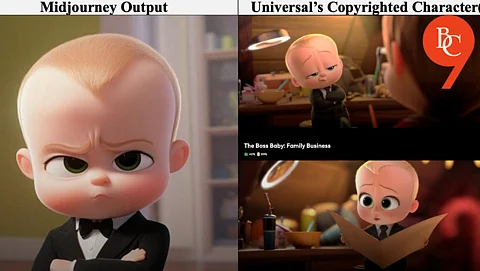

Disney and Universal have filed a groundbreaking lawsuit against Midjourney, one of the world’s most popular AI image generators. The entertainment titans allege that Midjourney’s technology has been used to create and distribute unauthorized images of their most famous characters from Darth Vader and Yoda to Bart Simpson and Elsa without permission, payment, or creative input from the original rights holders.
Filed in federal court in Los Angeles, the lawsuit accuses San Francisco-based Midjourney of building its business on the backs of Hollywood’s most valuable intellectual property. The studios claim that Midjourney’s AI models were trained on vast, unlicensed datasets containing images of beloved characters, allowing users to generate new artwork that is often indistinguishable from the originals.
Disney and Universal’s complaint pulls no punches, describing Midjourney as a “bottomless pit of plagiarism” and a “copyright free-rider.” The studios argue that the company’s refusal to implement safeguards or even respond to cease and desist requests amounts to deliberate, calculated infringement.
The lawsuit is more than a legal skirmish it’s a battle for the soul of the entertainment industry and the future of generative AI. Disney and Universal are seeking $150,000 in damages for each infringed work, with the complaint listing over 150 examples. If successful, the damages could easily exceed $20 million. The studios are also demanding a court order to halt Midjourney from generating or distributing any further infringing images or launching its anticipated video generation service.
The complaint highlights Midjourney’s explosive growth, noting that the company generated $300 million in revenue last year and is preparing to expand into AI-generated video, raising the stakes even higher.
This case marks the first major legal showdown between Hollywood and an AI firm over image generation, but it’s part of a much larger debate. Artists, musicians, and writers have all raised alarms about AI models trained on their work without consent, fearing not just lost revenue but the erosion of creative professions.
While AI companies often claim “fair use” protections for training on publicly available data, the entertainment industry argues that such practices undermine the very incentives that drive innovation and artistry in film, television, and the arts.
If Disney and Universal prevail, the outcome could ripple across the tech and entertainment sectors. It may force AI companies to license content, overhaul training practices, or implement robust safeguards to prevent the generation of copyrighted material. For Hollywood, it’s a fight to protect decades of creative investment and the livelihoods of countless artists and storytellers.
